2013 in review: news stories from the world of asylum, immigration, human rights and NCADC.
This was another year of the UK’s hostile environment, and the EU’s fortress europe. Some of this news will make you angry, upset or depressed. But we have some inspiring, uplifting stories too, of solidarity in the struggles for freedom, justice and equality.
And keep a look out for our campaign review of the year in January, for more stories of communities coming together to fight for migrants’ rights.
January
“Bounty Hunters” for Home Office
The year begin with a theme that continued throughout 2013: outsourcing of immigration enforcement, and resulting abuse and ineptitude.
Over the 2012-2013 Christmas holiday, thousands of migrants received threatening text messages telling them they did not have the right to be in the UK and should leave the country immediately. But many of them reportedly had valid visas, leave to remain or even British passports. The texts were sent on behalf of the immigration authorities by the outsourcing giant Capita under a new £30 million contract to trace and contact ‘overstayers’.
Read more on the Corporate Watch website.
February
Home Office #anti-social media
Valentines Day saw the Home Office – those old romantics – reaching a new low. And if we thought they’d reached rock bottom, we only had to wait till the summer’s Racist Van campaign to be proved wrong. On February 14, just minutes after pledging to end violence against women and girls, the Home Office Twitter account went into overdrive.
Using the hashtag #happyvalentinesday, they tweeted archived photos of distressed migrants being dragged away on their wedding day, accompanied by messages such as “Do you take this woman to be your sham bride? #HappyValentinesDay” and “#rosesareredvioletsareblue if your marriage is sham we’ll be on to you”.
There were so many objectionable aspects to this social media experiment that it was hard to know where to start. That the concept of a ‘sham marriage’ is entirely subjective, but a concept that is only used in reference to migrants? Perhaps with the fact that the photos are several years old, suggesting some time and thought has gone into this despicable exercise? Or that the woman being dragged away, crying, handcuffed in one of the images is clearly identifiable? Or the glorying in other people’s misery (experienced before with the Home Office on Twitter, during the Operation Mayapple outrage). Perhaps the most disgusting element of the whole affair was the jokey tone of the messages, revealing an almost unbearable cynicism and disrespect for people’s lives. Read more >>
When maternity doesn’t matter?
Also in February, Refugee Council and Maternity Action launched a joint report called When Maternity Doesn’t Matter, about dispersing pregnant women seeking asylum. The report found that dispersal and relocation of pregnant women seeking asylum has a serious impact on their physical and mental health, and negative affects the maternity care they receive.
The report found that the UKBA’s ‘protected period’ (not dispersing for four weeks either side of delivery) failed to prevent the interruption of maternity care and didn’t recognise the importance of postnatal care for at least six weeks after the birth. The report criticised the UKBA’s ‘Healthcare and Pregnancy Dispersal Guidance’ for not mentioning mental or physical health issues arising in pregnancy, nor many underlying health problems that may affect women. The guidance also doesn’t address women’s need for social and family support throughout pregnancy and labour. The report concludes that maternity care costs are increased by wasting valuable resources in searching for women who have been moved without the service being informed, and by generating a need to repeat tests and scans. The report demonstrated the need for UKBA to reconsider its policy of dispersing pregnant women and made several recommendations. Download the report here.
One Billion Rising
To keep us going during this depressing month, we watched Women for Refugee Women’s heartwarming video, released to celebrate One Billion Rising on 14 February.
And we were inspired by this protest in Vienna, in which dozens of asylum-seekers camped out in a famous Roman Catholic church in central Vienna, the Votivkirche, protesting against Austria’s asylum laws.
March
March was a month of travel.
NCADC went on a Trans-Pennine toolkit training tour, running full-day workshops in Manchester and Huddersfield with old friends WAST Manchester and Beacon Bradford, new friends, including Migrant Artists Mutual Aid, based in Liverpool.
Meanwhile in Germany, an amazing Refugees Revolution Bus Tour journeyed through the country, calling for an end to inhuman deportations, the closure of refugee camps (detention) and the abolition of “Residenzpflicht“, which requires foreigners including refugees to live in designated areas. Read more about the bus tour, and see photos here.
Oh and UKBA was abolished.
We’ve yet to see any difference. We only found out the new names for the relevant Home Office departments in July, and even now enforcement officers are still wearing uniforms that say UKBA. But it surely can’t get any worse. Can it?
June
Campaign to save Legal Aid takes to the streets
On 4 June, hundreds of lawyers and others demonstrated against the proposed cuts outside the Ministry of Justice headquarters in London. The protest, organised by trainees at Tottenham firm Wilson Solicitors, marked the end of the eight-week consultation on plans to cut £220m from the criminal legal aid budget through price-competitive tendering, removal of client choice, the introduction of a 12-month residence test and a £37,500 disposable income threshold. The Ministry had received over 13,000 responses to its Transforming Legal Aid consultation.
We published five blog post about the Legal Aid cuts: In July Save legal aid EDM and petition and Transforming Legal Aid – Proposals and commentary so far, in August: Legal Aid – the Scottish perspective, and in September: Legal aid consultation – next steps and What next for the legal aid campaign? Stop the residence test!
Stop G4S: protest at AGM
On 6 June, NCADC joined a protest at the annual shareholders meeting of G4S, the notorious security company responsible for the death of Jimmy Mubenga in a deportation attempt, and for the misery of thousands imprisoned in immigration detention centres and sub-standard asylum seeker housing.
Across Europe, G4S are becoming a pariah company as trade unions, charities and faith-groups take a public stand in opposing its drive to put private profit above human rights. Organisations in the Middle East have called for a boycott of G4S due to their complicity with Israel’s repression and detention of Palestinians including children.
On June 6th the company returned to the City of London for its annual corporate jamboree, and was met with protests outside and inside the meeting. You can find videos of the protests on youtube here, and read our three part article on G4S on the blog.
NCADC in Belfast
On 14th June we headed to Belfast for a training session with the Refugee Action Group. It was a great event, and we had a wonderful warm welcome from the group, although the trip did start rather strangely…
Our visit coincided with the G8 summit in the north of Ireland, and the six counties were in security lockdown. On the ferry, there were about a dozen civilians and what seemed like thousands of uniformed riot police. It was rather bizarre, as was the sight of many more, fully armed, policing the demonstration for social justice led by apparently dangerous trade unions, NGOs and church groups.
The full-day training session on campaigning for the right to remain was a great success, with over 50 participants, around half being refugees. We were moved when one participant said to us that, next time they went to report at the Home Office, they could hold their head high knowing that they had power to do something in support of their asylum case. We hope to return to Belfast next year for another session.
The Mazloom tour
At the end of June we started the first leg of our national tour of the play, Mazloom. Mazloom is a portrait of a young refugee whose life is being torn apart by the impending prospect of deportation from the UK to Afghanistan. The play is based on the experiences of young Afghans in London, who as children were forced by war to leave their family and home to seek safety in the UK.
In June and July we took the play to audiences in London, Newcastle, Canterbury, Leicester and Brighton, returning for the second leg in Glasgow and Manchester in the autumn. We sold out theatres in every town, and used the events to start debates and action plans for campaigning and supporting young migrants. Read more about Mazloom here.
July
Jimmy Mubenga – unlawfully killed by G4S
In July, Jimmy Mubenga’s family got a semblance of justice when the inquest jury found a verdict of unlawful killing while being restrained by G4S guards in a deportation attempt in 2010. The family had to wait too long, and fight too hard, for this and the issue of criminal prosecution of the guards has not been resolved. Read more on the blog.
There was another death in detention:
Tahir Mehmood, a 43-year-old Pakistani man, died in Pennine House, a short-term holding facility. This was the first death in Pennine House, but just one of a shocking number of deaths in immigration detention as a whole.
And who could forget the Racist Van?
In July, for one-week, the Home Office launched a £10,000 “advertising campaign” which involved vans driving around six London boroughs (Barking & Dagenham, Barnet, Brent, Ealing, Hounslow and Redbridge – areas with sizeable Asian populations, and offering only Asian languages for translation) carrying ads asking ‘In the UK illegally?’, saying if you were, you could text a number ‘for free advice and help with travel documents’.
The campaign was roundly condemned in all quarters (“This anti-immigrant ad campaign is racism, pure and simple” the Guardian) with even the Daily Mail asking ‘Is this the most ridiculous Home Office stunt yet?’. The campaign was subject to a legal challenge, and a cheering internet response.
September
Women in Yarl’s Wood – abuse and fightback
In September, the Observer newspaper reported allegations of sexual abuse of detainees by Serco officers at Yarl’s Wood detention centre. Witnesses came forward, reporting that they had seen guards touching women inappropriately, and alleged that guards gave detainees the impression they could help with immigration cases in return for sexual contact, and breached Serco company policy by entering women’s rooms at night.
NCADC is opposed to all immigration detention. It is a form of violence against migrants, and this recent Yarl’s Wood story is not a shocking anomaly but proof of the systematic abuse that detention allows and encourages. We took part in a rousing demo outside the Home Office in London, which you can read about on the blog, here.
October
NCADC members vote to change name:
Right To Remain
At NCADC’s AGM on 5 October, members voted for a new name for the organisation: Right to Remain.
NCADC’s management committee had been considering a name-change for some time. The nature of our work has changed over the years, in response to the changing environment for migrants in the UK. It was felt that the name no longer reflected our work, that the use of the term “deportation” can be confusing, and that it is also a very long and difficult name to say or remember – particularly if English is not your first language.
It’s an exciting development for the organisation and the new name will be launched early in 2014. NCADC is also starting the process of applying for charity status. Read more at the blog, here.
Remembering those who have died at the borders
At the end of the AGM, we had a minute’s silent reflection, to pay our respects to the people who drowned off the coast of Lampedusa earlier in the week, and for all those who have lost their lives because of border controls.
November
Collective expulsion: the case against mass deportation charter flights
In November, Corporate Watch and Stop Deportation launched a major new report: ‘Collective Expulsion: The case against Britain’s mass deportation charter flights’. The report is available to buy online.
The report examines the Home Office’s use of mass charter flights to carry out volume removals/deportations, and the misleading justifications for such flights. Corporate Watch’s research reveals that the arguments used by the Home Office to justify mass charter deportation/removal flights have no basis in reality. Instead, the report suggests that the UK Government must have ulterior motives, such as a ‘target culture’ and foreign policy considerations.
The report also looks at whether mass deportations could be argued to be ‘collective expulsion’ – the deportation/removal of a group of people without full consideration of their individual cases – which is prohibited under Protocol 4 of the European Convention on Human Rights. A recommended read on one of the darkest aspects of the UK’s immigration policy.
December
A lesson from the school students:
Kein mensch ist illegal! – No one is illegal!
And we end the year on a heartening note. As we are told the UK is set to celebrate its ‘most German Christmas yet’, that’s probably not a bad thing as we were once again inspired by solidarity actions on the continent.
As the year drew to a close, more than 3,500 pupils in Hamburg went on strike for refugee rights and marched to the city’s Social Democratic Party headquarters.
They were demonstrating for a group of 300 African refugees that arrived from the island of Lampedusa to Hamburg in spring 2011 and want the right to stay. But the city’s senate sees no legal reason to allow them to remain, the Hamburger Morgenpost reported.
The strike was not backed by schools and pupils who took part were marked as absent in their registers. They also had to provide a letter from their parents as to why they were not in class, spokesman from the education authorities Peter Albrecht told the paper. But the Education and Science Workers’ Union (GEW) saw the pupils’ strike as “a hands-on politics lesson.” Photos here and a great video on youtube here.


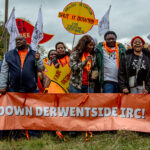

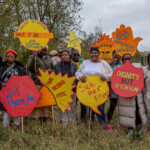
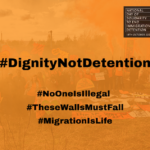

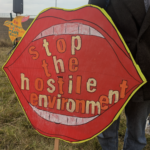




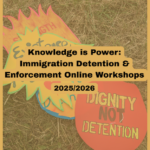
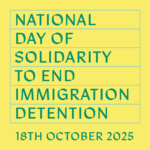
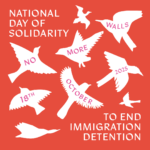
Discussion: